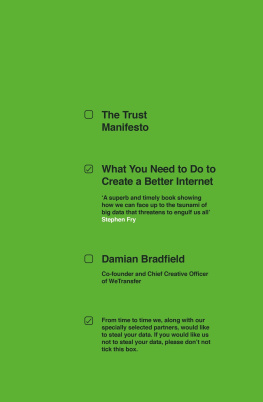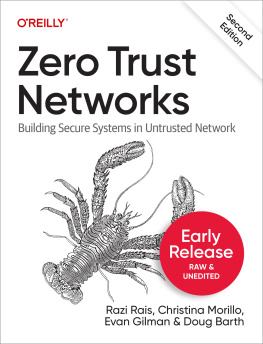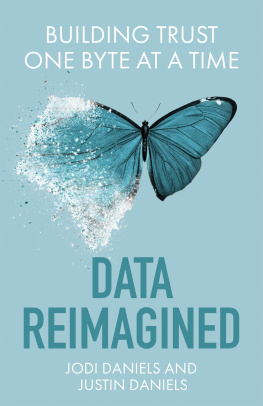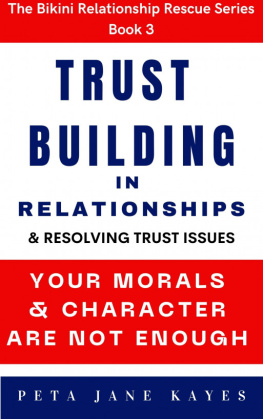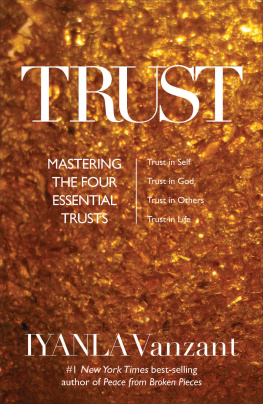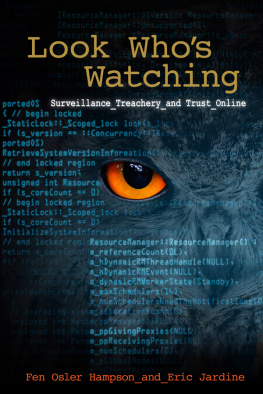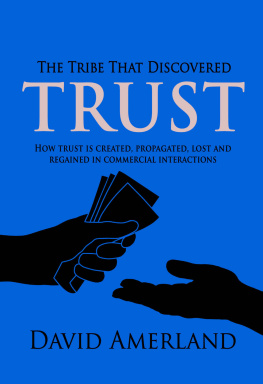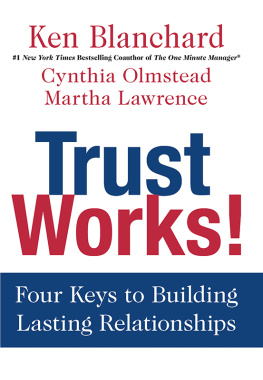Damian Bradfield
THE TRUST MANIFESTO
What You Need to Do to Create a Better Internet

PENGUIN BOOKS
UK | USA | Canada | Ireland | Australia
India | New Zealand | South Africa
Penguin Books is part of the Penguin Random House group of companies whose addresses can be found at global.penguinrandomhouse.com.

First published 2019
Copyright Damian Bradfield, 2019
The moral right of the author has been asserted
Cover design Luke Bird
With thanks to Calcanet Press for permission to use Ode to Bill by John Ashbery on Trevor Paglen, 2015.
ISBN: 978-0-241-36986-9
This ebook is copyright material and must not be copied, reproduced, transferred, distributed, leased, licensed or publicly performed or used in any way except as specifically permitted in writing by the publishers, as allowed under the terms and conditions under which it was purchased or as strictly permitted by applicable copyright law. Any unauthorized distribution or use of this text may be a direct infringement of the authors and publishers rights and those responsible may be liable in law accordingly.

Prologue
You need to buy shoes.
Your running shoes are falling apart.
Its only a matter of time before a sole starts flapping.
As you wander closer to the displays at the shoe shop, youre approached by one of the employees.
Youve been dealing with sales pitches for as long as youve been shopping, which is almost as long as youve been alive.
Youre used to both the soft and hard sell, the obsequious attention and the dealings of a hassled employee.
This employee is unobtrusive.
Even now it would be difficult to describe him.
Hes just a guy, an extension of the store, a helping hand who would like to make a sale.
As youre talking to him you have a thought.
You know what?
Theres that other shoe store.
Its further away, but its worth a shot.
They stock sensible shoes.
Sensible running shoes might be a good thing these days.
So, after looking at a couple of pairs, and even trying on some Nikes, and walking a few feet in them, feeling for pinching in the toes, you turn to the sales associate and tell him what youve told people working in stores for all your shopping life: I really appreciate the help.
Then youre out of there, and the door closes.
You walk to the corner and wait to cross the road.
Youve got other stuff on your mind, so you dont immediately recognize the person standing beside you, looking at you.
Where have you seen that sandy-blond hair before?
Where have you seen that face?
Its the sales associate.
Thats weird.
He must move with speed.
Perhaps its one of the reasons why he got a job at a store selling athletic shoes.
After you give him a weak smile, a smile you hope will act as a farewell, he says, Are you sure you dont want those Nikes?
The Nikes I tried on? you ask.
Yes, he responds. Ive got a photo of them right here.
So you give it a cursory glance and then say, again, Thank you, no.
You walk away, and you dont look back to see if the guy is following you because you dont want to encourage him in any way.
One way of taking your mind off that odd experience is to buy vegetables for dinner. Theres a supermarket nearby, a calming place, especially the vegetable section, especially when the overhead sprays come on to dampen all the produce.
Youre looking at the apples.
Then you notice something, or someone, a man hiding behind the pyramid of apples.
When you edge closer you notice its the guy from the shoe store.
Hes crouched down, staring up at you with youve got to admit it a fervent look in his eyes.
Hi, Im just wondering if youve reconsidered, he says in that insistent voice.
Reconsidered what? you ask.
You check to see if theres a grocery store employee nearby, just in case.
Reconsidered the shoes, he says. Ive got a photo of them here.
And he rises out of his squat to show you the photo.
I really dont need to see that photo, you say.
They come in other colours, he replies, and its a great deal.
Look, you reply, I left your store.
Im not interested, and even if I was, I dont appreciate you popping up like this while Im in another store.
Is it even legal for you to be behaving like this?
He doesnt say anything.
He stands very still.
Now things get strange.
As youre walking home you can see him in other stores, staring out of the windows as you pass by.
And when you arrive home and set the groceries down to grab the mail, you open the mailbox to find its already packed with flyers and mailouts and newsletters from the shoe store, and theres that photo of the same pair of Nikes.
Its dark but you begin to sense something, a presence, in the darkness.
And sure enough, when you turn on the light, theres the sales associate, with his bland face, and that look in his eyes, sitting on your couch like theres nothing wrong, like its fine to be in your space, to know your habits, to follow you around that blankness is not the look of someone engaging in behaviour they know to be bad, or even questionable.
Hes just looking at you.
Youd be surprised, he says, how much I know about you.
Id be happy to suggest some other shoes you might like based on your trip to the store.
I wouldnt like that, thank you, you say, somehow still dealing with this guy with a politeness he seems to have forgotten.
In days gone past this would have been called home intrusion.
Would you like me to show you the shoes again? he asks.
Is there something wrong here?
Is there a reason why he doesnt seem fazed by this?
Are you the problem in that you remember, somewhere in the recesses of your mind, a world before both our shopping habits and our sense of privacy got capsized?
People dont mind this, the man says, and you think of how often a statement like this has been used to justify change.
Youre guilty of it.
People live their life on smartphones, you yourself announced a while ago.
You dont want a scene.
You did, after all, go into the store.
But when you ask him to leave he looks at you, again, with that look of a man who has done nothing wrong, who is unimpeachably innocent, and says, Thats fine.
But could you fill out this survey first?
*
This book is for people whose professional and personal lives have been upended by technology.
Its for those who are now required to be always on, for those who have been drawn into lives of convenience at all cost.
Its for those who want to read short sentences and then get angry.
Its for those who want to question the online status quo and explore the possibilities of the internet, perhaps even envision a future where we finally understand the effects of spam, clickbait and attention-sapping media.
Im not Jaron Lanier, or any other tech seer youd like to name.
Im not a genius.
I can talk from a position of a touch of success.
This is all based on real-life experiences within a (soon to be) billion-dollar company, WeTransfer.
The book will view the world from both inside and outside the bubble.

